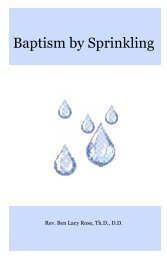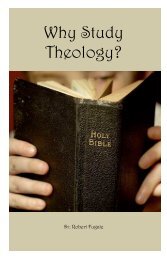"Has God Indeed Said?" - Biblical Blueprints
"Has God Indeed Said?" - Biblical Blueprints
"Has God Indeed Said?" - Biblical Blueprints
Create successful ePaper yourself
Turn your PDF publications into a flip-book with our unique Google optimized e-Paper software.
6 • <strong>Has</strong> <strong>God</strong> <strong>Indeed</strong> <strong>Said</strong>?<br />
are based on is found in Egypt, a place that had no letters sent to<br />
it, but where most of the early heresies originated. 10<br />
Humanistic versus <strong>Biblical</strong> Presuppositions<br />
Majority Text advocates are often criticized for bringing<br />
<strong>Biblical</strong> presuppositions into the study of texts rather than being<br />
neutral. But while objectivity is important, neutrality is<br />
impossible. Evaluation of the evidence is always driven by prior<br />
presuppositions.<br />
The presuppositions that drive modern textual criticism are<br />
thoroughly humanistic even when evangelicals use them. It is<br />
ironic that evangelicals who shrink in horror from the humanistic<br />
assumptions found in "higher criticism" have adopted the same<br />
assumptions when it comes to textual criticism. For example,<br />
Edward John Carnell rightly rejected higher criticism because "a<br />
fundamental presupposition of the higher critic is that the Bible<br />
is just another piece of human writing, a book to which the<br />
scientific method may safely be applied, not realizing that the<br />
Bible message stands pitted in judgment against that very<br />
method itself." 11 However he advocated textual criticism with the<br />
same presupposition.<br />
Warfield and all later textual critics within the evangelical<br />
camp treat it in the same way they treat the transmission of<br />
secular documents. L Harold De Wolfe, a liberal complained<br />
about the inconsistency saying,<br />
"The intimate and inseparable relation between textual and<br />
historical studies of the Bible seems not to be adequately<br />
appreciated by some conservative scholars. For example,<br />
Edward J. Carnell praises unstintingly the devotion, skill,<br />
and results of textual criticism ... On the other, when the<br />
10<br />
On this last point, Pickering deduces some major implications in the last<br />
chapter of this book.<br />
11<br />
Edward John Carnell, An Introduction to Christian Apologetics (Grand<br />
Rapids: Eerdmans, 1956), p. 194.






